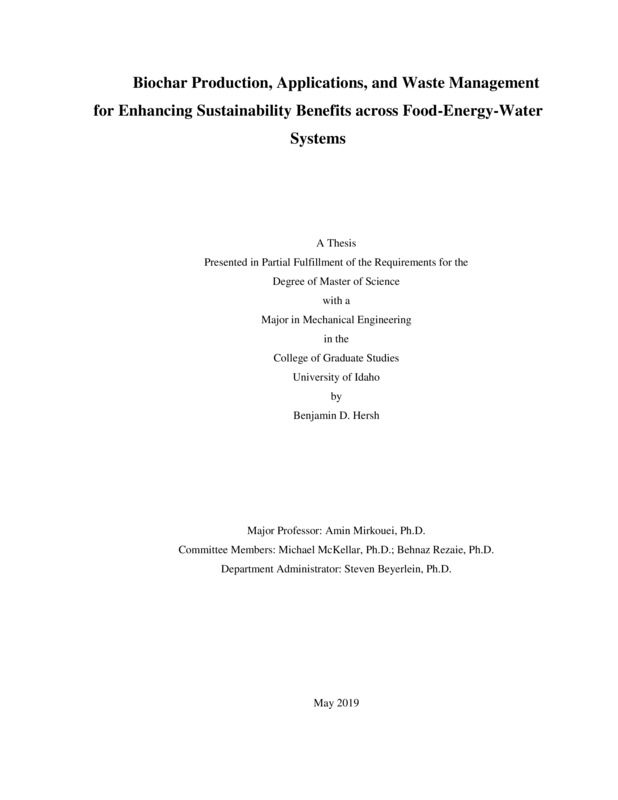Biochar Production, Applications, and Waste Management for Enhancing Sustainability Benefits across Food-Energy-Water Systems
Hersh, Benjamin D.. (2019-05). Biochar Production, Applications, and Waste Management for Enhancing Sustainability Benefits across Food-Energy-Water Systems. Theses and Dissertations Collection, University of Idaho Library Digital Collections. https://www.lib.uidaho.edu/digital/etd/items/hersh_idaho_0089n_11592.html
- Title:
- Biochar Production, Applications, and Waste Management for Enhancing Sustainability Benefits across Food-Energy-Water Systems
- Author:
- Hersh, Benjamin D.
- ORCID:
- 0000-0003-1171-8053
- Date:
- 2019-05
- Embargo Remove Date:
- 2020-07-08
- Keywords:
- Biochar Food-Energy-Water nexus Life-cycle assessment Pyrolysis
- Program:
- Mechanical Engineering
- Subject Category:
- Engineering; Bioengineering; Energy
- Abstract:
-
The future of food-energy-water resources is an ever-increasing global concern due to a growing standard of living and population. Particularly, a global increase in demands for food requires substantial land, energy, and water resources to address the future need and mitigate negative environmental impacts. Reusing or recycling resources is one of the promising approaches to reduce the negative impacts of the food system on the agro-ecosystem. A comprehensive literature review of food-energy-water (FEW) nexus and the applications and advantages of pyrolysis-char (biochar) to FEW-related issues is conducted in this study, including narrative and systematic reviews. Biochar production from biomass feedstocks can be accomplished in different ways and is beneficial for organic and sustainable soil amendment and several other FEW-related applications. This study proposes a mixed, portable fast and slow pyrolysis conversion pathway to facilitate biochar production process near the feedlot or drylot areas and address major challenges in the biochar industry infrastructure. According to the International Biochar Initiative classification approach and obtained results from physiochemical properties analysis, biochar produced in this study characterized as a Class 1 fertilizer due to its properties. Additionally, a gate-to-gate life-cycle assessment is provided to evaluate energy consumption, heat loss, and environmental emissions across biomass-to-biochar conversion processes and systems. These analyses are essential in understanding the process intricacies and determining optimization opportunities for future work. It is concluded that the proposed approach in this study is capable of reducing the handling, transportation, and storage costs by producing and transferring high-quality biochar instead of transferring low-energy density biomass feedstocks.
- Description:
- masters, M.S., Mechanical Engineering -- University of Idaho - College of Graduate Studies, 2019-05
- Major Professor:
- Mirkouei, Amin
- Committee:
- Rezaie, Behnaz; McKellar, Michael
- Defense Date:
- 2019-05
- Identifier:
- Hersh_idaho_0089N_11592
- Type:
- Text
- Format Original:
- Format:
- application/pdf
- Rights:
- In Copyright - Educational Use Permitted. For more information, please contact University of Idaho Library Special Collections and Archives Department at libspec@uidaho.edu.
- Standardized Rights:
- http://rightsstatements.org/vocab/InC-EDU/1.0/

